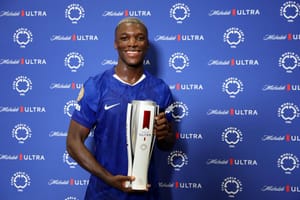Chelsea face a significant challenge in their FIFA Club World Cup quarter-final against Palmeiras, at Lincoln Financial Field in Philadelphia. The absence of Moises Caicedo, a pivotal figure in Chelsea’s midfield, due to a suspension following an accumulation of yellow cards, forces manager Enzo Maresca to make a critical decision in reshaping his starting XI.
Caicedo’s absence leaves a void in the defensive midfield role, where his energy, ball-winning ability, and tactical discipline have been integral to Chelsea’s campaign. With several options available (as shown below), Maresca will need to make the correct change if Chelsea want to advance through to the semi-final.
What do we do with Caicedo out vs Palmeiras?
— CFC-Blues (@CFCBlues_com) July 1, 2025
CM: Essugo, Santos..?
AM: Nkunku, KDH..?
LW: Madueke, George..? pic.twitter.com/fnuFyuEVpD
Central Midfield Options: James, Essugo, Santos
- Reece James: The Chelsea captain is primarily a right-back but has occasionally been deployed as a defensive midfielder, notably in matches like those against Legia Warsaw, Arsenal, and Aston Villa last season. His versatility allows him to drop into midfield, offering physicality and ball-playing ability. However, his deployment in midfield has led to errors in the past, and moving him from his natural position could weaken the backline, especially with Malo Gusto already filling an attacking role in recent games. Using James in midfield feels like a high-risk, makeshift solution against a strong opponent like Palmeiras.
- Dario Essugo: The 20-year-old Portuguese midfielder, signed from Sporting for £18.5 million, is seen as Caicedo’s direct understudy. Essugo shares a similar playing style—aggressive, mobile, and adept at breaking up play—making him a natural fit for the defensive midfield role. His limited game time so far, including a brief substitute appearance against LAFC, suggests he’s still integrating into the squad, but Maresca’s trust in him as Caicedo’s backup makes him a strong candidate. Essugo’s physicality and familiarity with high-pressing systems could be crucial against Palmeiras’ dynamic midfield.
- Andrey Santos: The 20-year-old Brazilian midfielder, returning from a successful loan at Strasbourg, offers a blend of defensive grit and progressive passing. Despite his potential, Santos has seen limited minutes in the Club World Cup, raising questions about his immediate readiness to step into Caicedo’s role. Maresca reportedly views Santos as a competitor for Fernandez’s role rather than Caicedo’s, which may reduce his chances of starting in the deeper position. However, his familiarity with Brazilian football could be an asset against Palmeiras.
Attacking Midfield Options: Nkunku, Dewsbury-Hall
If Maresca opts to adjust his system, he could drop Fernandez into a deeper role alongside Lavia, opening up the attacking midfield position. This would allow Chelsea to maintain their defensive structure while introducing a more creative player higher up the pitch.
- Christopher Nkunku: The French forward has been a substitute in recent matches but made a significant impact against Benfica, scoring in extra time to help secure a 4-1 victory. Nkunku’s versatility allows him to play as a No. 10 or on the left wing, and his goal-scoring instinct could add a new dimension to Chelsea’s attack. Starting him as an attacking midfielder would enable Palmer to stay in his preferred central role, with Nkunku’s flair and finishing potentially troubling Palmeiras’ defense.
- Kiernan Dewsbury-Hall: The former Leicester midfielder also scored as a substitute against Benfica, showcasing his ability to arrive late in the box. His work rate and passing range make him a viable option in the No. 10 role, though he lacks Nkunku’s clinical edge. Dewsbury-Hall’s familiarity with Maresca’s system, having played under him at Leicester, could give him an edge in terms of tactical understanding.
Left Wing Options: Madueke, George
Maresca could also shift Palmer to the No. 10 role and deploy a new left winger, especially if Fernandez drops deeper to cover Caicedo’s absence.
- Noni Madueke: The English winger started on the right against LAFC but has been overtaken by Pedro Neto in that position. Moving him to the left wing, where he’s less comfortable, could be an option to maintain attacking width. Madueke’s directness and pace could stretch Palmeiras’ defense, but his inconsistent form in the tournament makes him a riskier choice.
- Tyrique George: The young winger has been a substitute in the Club World Cup, offering glimpses of his potential. His inclusion would be a bold move by Maresca, but his lack of experience at this level makes him an unlikely starter in a crucial quarter-final.
Who we think Maresca may opt for:
Dario Essugo's profile closely aligns with Caicedo’s, with Chelsea signing him as a Caicedo back-up, however, Maresca will need big belief in him if he is to opt for him in such a big game.
Reece James is most certainly an option in midfield, with Acheampong or Gusto filling the RB spot. This would probably be the most likely change that Maresca does.
After Nkunku and KDH both came on and scored against Benfica, he could opt for a more attacking outlet against Palmeiras, with Enzo and Lavia being the midfield two. I'd be very surprised if he opted for Madueke or George, with neither of them getting a feature against Benfica.





